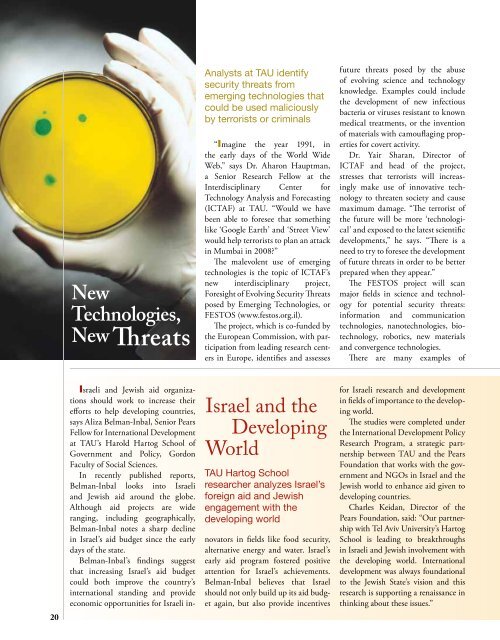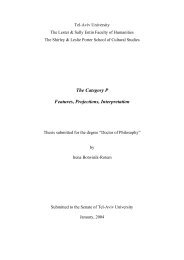You also want an ePaper? Increase the reach of your titles
YUMPU automatically turns print PDFs into web optimized ePapers that Google loves.
New<br />
Technologies,<br />
New Threats<br />
Analysts at TAU identify<br />
security threats from<br />
emerging technologies that<br />
could be used maliciously<br />
by terrorists or criminals<br />
“Imagine the year 1991, in<br />
the early days of the World Wide<br />
Web,” says Dr. Aharon Hauptman,<br />
a Senior Research Fellow at the<br />
Interdisciplinary Center for<br />
Technology Analysis <strong>and</strong> Forecasting<br />
(ICTAF) at TAU. “Would we have<br />
been able to foresee that something<br />
like ‘Google Earth’ <strong>and</strong> ‘Street View’<br />
would help terrorists to plan an attack<br />
in Mumbai in 2008?”<br />
The malevolent use of emerging<br />
technologies is the topic of ICTAF’s<br />
new interdisciplinary project,<br />
Foresight of Evolving Security Threats<br />
posed by Emerging Technologies, or<br />
FESTOS (www.festos.org.il).<br />
The project, which is co-funded by<br />
the European Commission, with participation<br />
from leading research centers<br />
in Europe, identifies <strong>and</strong> assesses<br />
future threats posed by the abuse<br />
of evolving science <strong>and</strong> technology<br />
knowledge. Examples could include<br />
the development of new infectious<br />
bacteria or viruses resistant to known<br />
medical treatments, or the invention<br />
of materials with camouflaging properties<br />
for covert activity.<br />
Dr. Yair Sharan, Director of<br />
ICTAF <strong>and</strong> head of the project,<br />
stresses that terrorists will increasingly<br />
make use of innovative technology<br />
to threaten society <strong>and</strong> cause<br />
maximum damage. “The terrorist of<br />
the future will be more ‘technological’<br />
<strong>and</strong> exposed to the latest scientific<br />
developments,” he says. “There is a<br />
need to try to foresee the development<br />
of future threats in order to be better<br />
prepared when they appear.”<br />
The FESTOS project will scan<br />
major fields in science <strong>and</strong> technology<br />
for potential security threats:<br />
information <strong>and</strong> communication<br />
technologies, nanotechnologies, biotechnology,<br />
robotics, new materials<br />
<strong>and</strong> convergence technologies.<br />
There are many examples of<br />
20<br />
Israel <strong>and</strong> the<br />
Developing<br />
World<br />
TAU Hartog School<br />
researcher analyzes Israel’s<br />
foreign aid <strong>and</strong> Jewish<br />
engagement with the<br />
developing world<br />
Israeli <strong>and</strong> Jewish aid organizations<br />
should work to increase their<br />
efforts to help developing countries,<br />
says Aliza Belman-Inbal, Senior Pears<br />
Fellow for International Development<br />
at TAU’s Harold Hartog School of<br />
Government <strong>and</strong> Policy, Gordon<br />
Faculty of Social Sciences.<br />
In recently published reports,<br />
Belman-Inbal looks into Israeli<br />
<strong>and</strong> Jewish aid around the globe.<br />
Although aid projects are wide<br />
ranging, including geographically,<br />
Belman-Inbal notes a sharp decline<br />
in Israel’s aid budget since the early<br />
days of the state.<br />
Belman-Inbal’s findings suggest<br />
that increasing Israel’s aid budget<br />
could both improve the country’s<br />
international st<strong>and</strong>ing <strong>and</strong> provide<br />
economic opportunities for Israeli innovators<br />
in fields like food security,<br />
alternative energy <strong>and</strong> water. Israel’s<br />
early aid program fostered positive<br />
attention for Israel’s achievements.<br />
Belman-Inbal believes that Israel<br />
should not only build up its aid budget<br />
again, but also provide incentives<br />
for Israeli research <strong>and</strong> development<br />
in fields of importance to the developing<br />
world.<br />
The studies were completed under<br />
the International Development Policy<br />
Research Program, a strategic partnership<br />
between TAU <strong>and</strong> the Pears<br />
Foundation that works with the government<br />
<strong>and</strong> NGOs in Israel <strong>and</strong> the<br />
Jewish world to enhance aid given to<br />
developing countries.<br />
Charles Keidan, Director of the<br />
Pears Foundation, said: “Our partnership<br />
with Tel Aviv University’s Hartog<br />
School is leading to breakthroughs<br />
in Israeli <strong>and</strong> Jewish involvement with<br />
the developing world. International<br />
development was always foundational<br />
to the Jewish State’s vision <strong>and</strong> this<br />
research is supporting a renaissance in<br />
thinking about these issues.”

















